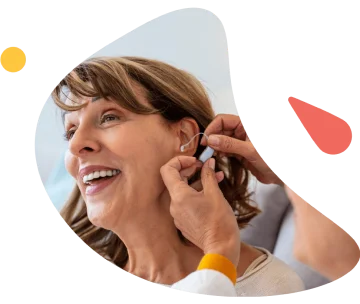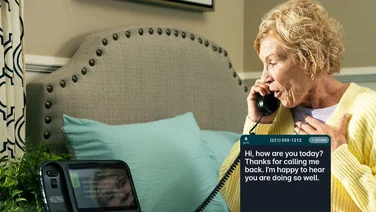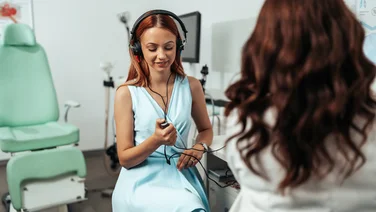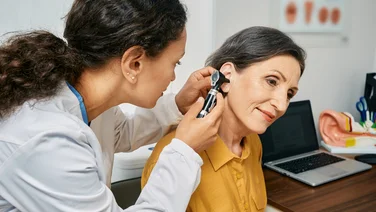It’s very common for people to experience hearing loss as they get older. Age-related hearing loss is called presbycusis, pronounced pres-buh-CUE-sis.
This page explains more about the condition that affects around 50% of US adults aged 75 and older.
Presbycusis is often a natural part of the ageing process, but other factors can contribute to hearing loss in older people, like exposure to loud noise over a prolonged period of time or underlying health conditions.
Presbycusis symptoms include difficulty keeping up with conversations, finding it hard to hear people on the phone, and needing to turn up the volume on the television, for example.
Age-related hearing loss is permanent and is likely to worsen with time. There is no cure, but there are ways to manage it.
The usual treatment for presbycusis is to wear hearing aids.
Concerned about your hearing?
We can help you book a free consultation with an audiologist
What is presbycusis?
Presbycusis is sensorineural hearing loss. This means it occurs as a result of damage or changes to a part of the inner ear or the auditory nerve that sends sound signals to the brain.
Presbycusis is a gradual decline in hearing as we get older. It’s one of the most common conditions affecting older and elderly people – but the process can begin in your 30s!

Presbycusis can be any degree of hearing loss, from mild to profound. It typically affects both ears and, because it happens gradually, often over many years, you might not realize you are losing your hearing for some time.
What causes presbycusis?
Presbycusis is generally caused by the normal ageing process. Ageing can change the way parts of the inner ear work, as well as the connections from the inner ear to the brain.
As a result of these changes, sound signals can’t be converted into electrical impulses, or those impulses can’t reach the brain to be interpreted.
Other factors can contribute to hearing loss as you get older, which can make it hard to identify the exact cause.
A common cause of age-related hearing loss is exposure to loud noise over a long time. This is called noise-induced hearing loss, and most older people who have impaired hearing have a combination of this and presbycusis.
Certain medical conditions that are prevalent in older people can also be a factor in age-related hearing loss, these include diabetes, high blood pressure, and heart disease.
These conditions can affect your circulation and worsen the flow of blood to your ears. The tiny hair cells in the inner ear, which help turn soundwaves into electrical impulses that travel to the brain, rely on a good blood supply. Without it, they become damaged and your hearing becomes impaired.
Certain medications can have an adverse effect on hearing and balance and can contribute to age-related hearing loss. These are called ototoxic drugs.
In some cases, presbycusis is caused by problems or abnormalities in the outer or middle ear, like the eardrum or the ossicles – the three tiny bones in the middle ear. This is rare, though.
Types of presbycusis
There are five main types of presbycusis based on four sites of aging in the inner ear (cochlea):
- Sensory presbycusis – a loss of hair cells in the cochlea.
- Neural presbycusis – a loss of cochlear nerve fibers and spiral ganglion neurons.
- Metabolic presbycusis – atrophy (wasting away) of the stria vascularis of the cochlea, which is responsible for the chemical balance of the inner ear.
- Mechanical presbycusis – a thickening and stiffening of the basilar membrane of the cochlea.
- Mixed presbycusis – a mixture of different types. Presbycusis rarely occurs exclusively at one site, and typically involves simultaneous changes at two or more of these sites.
Presbycusis symptoms
The main symptom of presbycusis is a very gradual loss of hearing in both ears. You might not realize at first – quite often other people will notice that you have difficulty communicating in certain situations.
- You have difficulty hearing or understanding the television or when talking on the phone
- You have difficulty following conversation in large groups or noisy environments
- You feel like your hearing is muffled, or people sound like they’re mumbling
- You misunderstand what other people are saying, or you have to ask them to repeat themselves
- You struggle to distinguish certain types of consonants, like ‘s’ and ‘th’
- You have more trouble hearing children and people with higher-pitched voices
- You have tinnitus – commonly known as ‘ringing in the ear’ – in one or both ears
- Your spouse or loved ones complain that you have difficulty hearing
Concerned about your hearing?
We can help you book a free consultation with an audiologist
How is presbycusis diagnosed?
If you think you have any type of hearing loss, including presbycusis, the first step is to visit an audiologist.
They will perform some hearing tests to assess the degree of hearing loss and identify any other treatable contributing factors, such as blockage (wax, for example) in the ear canal.
There is no specific test that can determine if your hearing loss is purely age-related or whether you also have noise-induced hearing loss.
The outcomes of these tests will help determine the best treatment.
Presbycusis treatment
Presbycusis is permanent hearing loss and, in most cases, it can’t be treated with medication or surgery. There is no cure.
If you have presbycusis, your doctor will probably recommend you use hearing aids. There are also other technologies that might help, like telephone amplifiers or devices that convert speech into text.
Some people with severe or profound age-related hearing loss might benefit from having a cochlear implant – a small electronic device that’s placed into your inner ear.
Living with presbycusis
It can be difficult to come to terms with hearing loss, especially if you’re older and have other age-related health conditions.
Any type of hearing loss can be deeply frustrating because it’s a barrier to communication and can make you feel increasingly isolated. In turn, this often leads to depression and anxiety.
Research shows a link between hearing loss and dementia, as well as an overall decline in cognitive function.
The more severe your degree of hearing loss, the greater the risk to your safety. For example, you might struggle to hear traffic noise or smoke alarms, which can put you in danger.
This may well sound frightening, but having your hearing assessed and finding a suitable treatment – typically a hearing aid that’s suited to you – will help you to mitigate those risks.
In addition, there are steps you can take to prevent your hearing from getting worse. For example, try to minimize how often you’re exposed to very loud noise and wear ear protectors or ear plugs.








